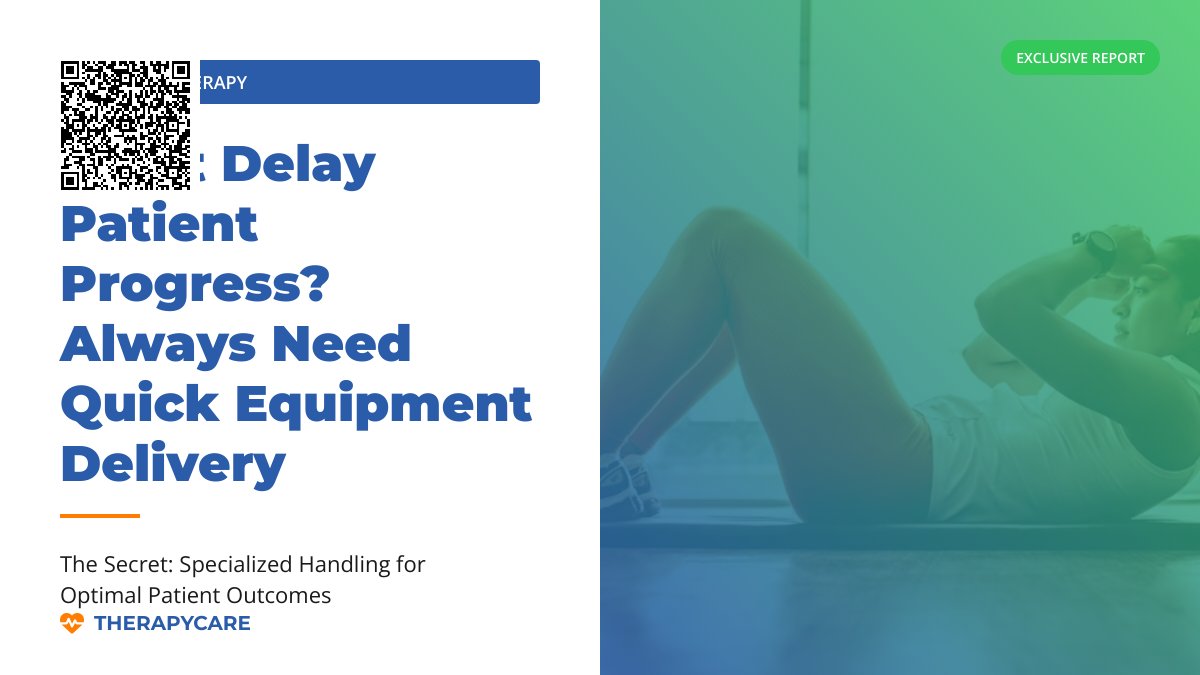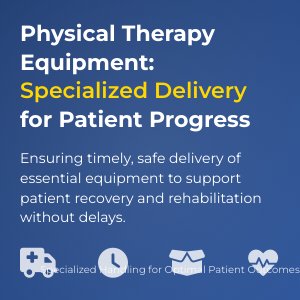Abstract: .
**Summary:**
This article explores the critical need for rapid equipment delivery for physical therapists, focusing on how delays can hinder patient progress. It highlights the challenges faced by therapists, including long lead times, inventory management issues, and complex logistics. The article argues that specialized handling and logistics are the key to overcoming these challenges, offering benefits such as reduced damage, faster delivery, and improved patient satisfaction. It emphasizes the importance of proper packaging, white-glove delivery, dedicated transportation, and real-time tracking to ensure that essential equipment is delivered promptly and safely, ultimately supporting patient outcomes.
---

Physical Therapists: Don't Delay Patient Progress? Always Need Quick Equipment Delivery – The Secret: Specialized Handling
Introduction: The Time is of the Essence in Physical Therapy
Physical therapy (PT) is a vital healthcare profession focused on restoring movement and function, reducing pain, and preventing disability. For patients recovering from injury, surgery, or managing chronic conditions, every session counts. Progress in physical therapy is often incremental, relying on consistent, targeted interventions. Therefore, delays in receiving necessary equipment can significantly hinder a patient’s recovery journey, impacting outcomes and potentially prolonging their suffering. This article explores the critical need for rapid equipment delivery for physical therapists, the challenges they face, and the often-overlooked secret to ensuring timely and safe arrival: specialized handling and logistics. We’ll delve into why prompt equipment access is crucial, the common bottlenecks, and how a focus on specialized handling can be the key to unlocking faster patient progress.
Why Quick Equipment Delivery Matters: Impact on Patient Outcomes
The core principle of physical therapy revolves around progressive overload and consistent engagement. A patient's therapy plan is meticulously designed, often requiring specific equipment to execute exercises and achieve desired results. Consider these scenarios:
- Post-Surgical Rehabilitation: Following knee replacement or shoulder surgery, patients rely on specialized braces, resistance bands, and therapeutic exercise devices to regain strength and mobility. Delays in receiving these items can postpone the initiation of crucial rehabilitation exercises, potentially leading to muscle atrophy and prolonged recovery times.
- Neurological Conditions: Patients with stroke, spinal cord injuries, or multiple sclerosis often require adaptive equipment like walkers, parallel bars, and specialized orthotics. Prompt access to this equipment allows therapists to immediately begin addressing mobility challenges and improving functional independence.
- Chronic Pain Management: Physical therapists utilize a wide range of tools, from electrical stimulation units to manual therapy aids, to alleviate pain and improve function in patients with chronic conditions like arthritis or fibromyalgia. Delayed equipment can disrupt treatment plans and negatively impact pain management strategies.
- Pediatric Physical Therapy: Children undergoing physical therapy for developmental delays or injuries need specialized equipment designed for their unique needs. Timely access ensures they receive the interventions necessary to maximize their potential and achieve developmental milestones.
Beyond the direct impact on physical progress, delayed equipment can also affect patient morale and adherence to treatment. Frustration and discouragement can arise when therapy sessions are repeatedly postponed or modified due to unavailable resources.
The Challenges Physical Therapists Face in Equipment Delivery
While the need for quick equipment delivery is clear, several challenges often impede the process:
- Long Lead Times: Many specialized physical therapy equipment items are custom-made or have long manufacturing lead times. This can result in weeks-long delays between ordering and receiving the equipment.
- Inventory Management Issues: Physical therapy clinics, especially smaller practices, may struggle with efficient inventory management. Overstocking ties up capital, while understocking leads to shortages and delays.
- Shipping and Logistics Complexities: Physical therapy equipment is often bulky, fragile, and requires specific handling to prevent damage during transit. Standard shipping methods may not be adequate, leading to delays and costly repairs or replacements.
- Supplier Communication and Order Tracking: Lack of clear communication with suppliers and inadequate order tracking systems can make it difficult to monitor the status of equipment orders and anticipate potential delays.
- Budgetary Constraints: Purchasing specialized equipment can be expensive, and clinics may need to prioritize purchases, potentially delaying the acquisition of essential items.
- Incorrect Ordering: Mistakes in ordering the correct equipment can cause significant delays. This can be due to a lack of training or insufficient communication between the therapist and the supplier.
The Secret Weapon: Specialized Handling and Logistics
The common thread running through many of these challenges is a lack of specialized handling and logistics. Treating physical therapy equipment like any other parcel is a recipe for delays, damage, and ultimately, frustrated patients. Here's why specialized handling is the key:
- Proper Packaging: Equipment should be packaged with appropriate cushioning and protective materials to prevent damage during transit. This includes using custom-fit boxes, foam inserts, and secure strapping.
- White-Glove Delivery: This service ensures that equipment is delivered with extra care, including unpacking, placement in the designated location, and inspection for damage. It's particularly crucial for large or complex equipment.
- Dedicated Transportation: Using carriers experienced in handling medical equipment can minimize the risk of damage and ensure timely delivery. These carriers often have specialized vehicles and trained personnel.
- Real-Time Tracking and Visibility: Advanced tracking systems provide real-time visibility into the location of equipment shipments, allowing therapists to anticipate arrival times and proactively manage patient schedules.
- Temperature Control: Some equipment requires specific temperature ranges during transit. Specialized logistics providers can ensure these requirements are met.
- Compliance with Regulations: Medical equipment transport often requires adherence to specific regulations (e.g., HIPAA compliance for patient data). Specialized providers are familiar with these requirements.
- Reverse Logistics: Efficient processes for returning damaged or unused equipment are also essential. A streamlined reverse logistics system minimizes downtime and ensures equipment is quickly replaced.
Benefits of Implementing Specialized Handling
Investing in specialized handling and logistics for physical therapy equipment yields significant benefits:
- Reduced Equipment Damage: Minimizes costly repairs and replacements, saving clinics money.
- Faster Delivery Times: Ensures equipment arrives on time, allowing therapists to adhere to treatment plans.
- Improved Patient Satisfaction: Reduces delays and frustration, leading to a more positive patient experience.
- Enhanced Clinical Efficiency: Therapists can focus on patient care rather than dealing with equipment issues.
- Increased Revenue: Faster patient progress and improved adherence can lead to increased revenue for the clinic.
- Better Inventory Management: Specialized providers often offer inventory management solutions, helping clinics optimize stock levels.
Choosing the Right Specialized Handling Partner
Selecting the right logistics partner is crucial. Consider these factors:
- Experience in Medical Equipment Handling: Look for a provider with a proven track record of handling sensitive medical equipment.
- Range of Services: Ensure they offer the services you need, such as white-glove delivery, temperature-controlled transport, and reverse logistics.
- Technology and Tracking Capabilities: Choose a provider with a robust tracking system that provides real-time visibility.
- Compliance and Security: Verify that they comply with all relevant regulations, including HIPAA.
- Customer Service: Excellent customer service is essential for resolving any issues that may arise.
- Cost-Effectiveness: Compare pricing and services from multiple providers to find the best value.
Conclusion: Prioritizing Equipment Delivery for Optimal Patient Care
In the demanding world of physical therapy, time is a precious commodity. Delays in equipment delivery can have a cascading effect, hindering patient progress, impacting morale, and ultimately compromising the quality of care. By recognizing the importance of quick equipment delivery and embracing specialized handling and logistics, physical therapy clinics can streamline their operations, improve patient outcomes, and create a more efficient and rewarding practice. The secret isn't just about ordering the right equipment; it's about ensuring it arrives safely, on time, and ready to be used, allowing physical therapists to focus on what they do best: helping patients regain their mobility and live healthier, more fulfilling lives.
Suggested Internal Links:
- Link to a blog post about specific types of physical therapy equipment (e.g., "Understanding the Benefits of Resistance Bands in Physical Therapy").
- Link to a page on your clinic's website detailing your commitment to patient care and utilizing advanced equipment.
- Link to a patient testimonial about the impact of timely equipment access.
Suggested External Links:
- American Physical Therapy Association (APTA): https://www.apta.org/ – A reputable source for information about physical therapy.
- A reputable medical equipment supplier’s website (e.g., DJO, Breg, DonJoy) - Demonstrates industry knowledge.
- Article or study on the impact of delayed rehabilitation on patient outcomes (search Google Scholar for relevant research).
- Logistics provider specializing in medical equipment (e.g., FedEx Healthcare Solutions, UPS Healthcare) – Showcases expertise and potential solutions.
Important Notes:
- Keyword Density: While I've incorporated keywords, always review the article and ensure the keyword density feels natural and doesn't appear stuffed. Google penalizes keyword stuffing.
- Readability: Use a readability checker (like the Yoast SEO plugin for WordPress) to ensure the article is easy to understand. Aim for a score of 60 or higher.
- Images & Videos: This article needs visuals. Include images of physical therapy equipment, therapists using the equipment, and potentially a video explaining the importance of specialized handling. Alt text for images should include relevant keywords.
- Schema Markup: Implement schema markup (specifically, Article schema) to help Google understand the content and display rich snippets in search results.
- Mobile-Friendliness: Ensure your website is mobile-friendly, as a significant portion of searches are now conducted on mobile devices.
- Promote & Share: Once published, actively promote the article on social media and other relevant platforms.
- Update Regularly: Keep the article updated with the latest information and trends in physical therapy and logistics.
- Local SEO: If your clinic serves a specific geographic area, incorporate local keywords (e.g., "physical therapy equipment delivery [city, state]").
- Target Audience: Consider who is searching for this information. Are they therapists, clinic managers, or patients? Tailor the language and content accordingly.
- Call to Action: Include a clear call to action at the end of the article (e.g., "Contact us today to learn more about our equipment delivery solutions," or "Schedule a consultation with our physical therapists"). Make it easy for readers to take the next step.














